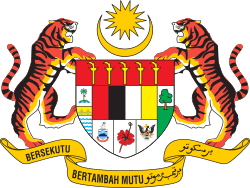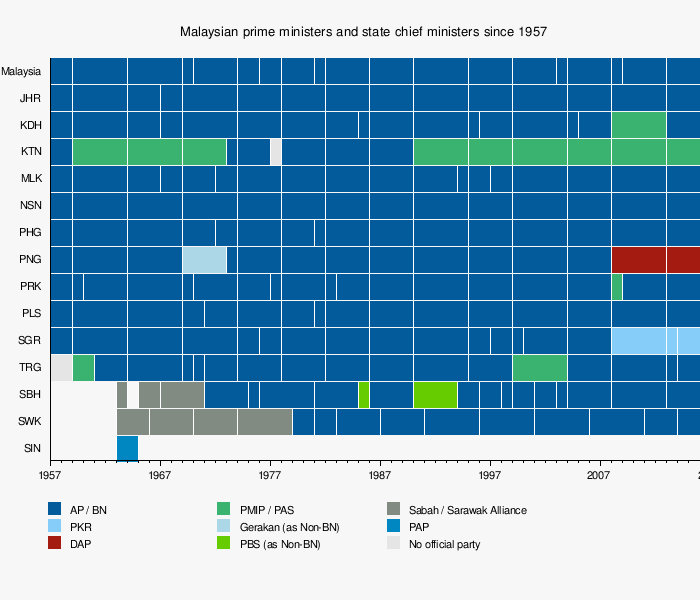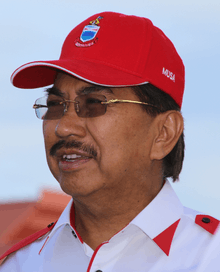Chief Ministers in Malaysia
 |
| This article is part of a series on the politics and government of Malaysia |
|
|
In Malaysia, the Menteri Besar (Jawi:منتري بسر; literally "First Minister") is the head of government of each of nine states in Malaysia with hereditary rulers. For four states without a monarch, the title Chief Minister (Ketua Menteri) is used. The title 'Menteri Besar' is usually untranslated in the English media in Malaysia,[1] but is typically translated as 'Chief Minister' by foreign media.[2] According to protocol, all Menteris Besar and Chief Ministers are styled Yang Amat Berhormat (abbreviated Y.A.B.), which means "The Most Honourable".
The nine hereditary rulers of the Malay states and the appointed governors of the other four states serve as constitutional and ceremonial heads of their states, with the state executive authority rests with the Menteris Besar and Chief Ministers. Following elections to the state legislative assembly, the Ruler or Governor usually invites the party (or coalition) with a majority of seats to form the state government. The Ruler or Governor appoints and swears in the Menteris Besar or Chief Ministers, whose executive council (except Sabah and Sarawak which known as Cabinet) are collectively responsible to the assembly. Based on the Westminster system, given that he retains the confidence of the assembly, the Menteri's Besar or Chief Minister's term can last for the length of the assembly's life—a maximum of five years. There are no limits to the number of terms that the Menteri Besar or Chief Minister can serve.
Background
In most states within Malaysia, the office was created by the British colonial government in 1948, in tandem with the creation of the Federation of Malaya. However, Johor was the first state to create the Menteri Besar position, subject to Undang-undang Tubuh Negeri Johor (Johor State Constitution) enforced by Sultan Abu Bakar. This had made Johor the first Malay state to adopt a system of constitutional monarchy. After Malaya gained independence from the United Kingdom in 1957, the office bearer is appointed among the state legislative assembly members by the Sultans. The Menteri Besar and Chief Minister usually comes from the party (or coalition) which commands a majority in the state assembly.
Relations between the First Ministers, Chief Ministers and other levels of government
For many decades, the First Ministers (Menteri Besar) and Chief Ministers (Ketua Menteri) met with each other and the Prime Minister at Mesyuarat Menteri-Menteri Besar dan Ketua Menteri.[3]
Selection process
Eligibility
By comparison, the thirteen state constitutions (Undang-undang Tubuh Negeri) have some similarities and also some differences in setting the principle qualifications one must meet to be eligible to the office of the Menteri Besar (or Chief Minister).
A Menteri Besar must be:
- a citizen of Malaysia.
- should be a member of the state legislature who command the confidence of the majority of the members of the Assembly.
- of 21 years of age or more.
- shall not hold any office of profit and engage in any trade, business or profession that will cause conflict of interest.
For nine states in Malaysia with hereditary rulers, the Menteri Besar (First Minister) must be an ethnic Malay male who professes the religion of Islam and must not a Malaysian citizen by naturalization or by registration. Only through royal consent can the office of Menteri Besar be held by an individual who does not meet these criteria.
For four states in Malaysia with governors (namely Penang, Malacca, Sabah and Sarawak), the Ketua Menteri (Chief Ministers) are open to any Malaysian citizen regardless of their religion, ethnicity and gender.
Election
The Menteri Besar (or Chief Minister) is elected through a majority in the state legislative assembly. This is procedurally established by the vote of confidence in the legislative assembly, as suggested by the Ruler (or Governor) of the state who is the appointing authority.
Oath
Since, according to the constitution, the Menteri Besar is appointed by the Ruler (or Chief Minister is appointed by the Governor), the swearing in is done before the Ruler (or Governor) of the state.
The oath of office and allegiance.
I, <Name of Menteri Besar or Chief Minister>, having been appointed to the office of <Name of Office> do solemnly swear (or affirm) that I will faithfully discharge the duties of that office so the best of my ability, that I will bear true faith and allegiance to the State of <Name of the State> and to the Federation, and that I will preserve, protect and defend the Constitution of the State of <Name of State>.
The oath of secrecy.
I, <Name of Menteri Besar or Chief Minister>, do solemnly swear (or affirm) that I will not directly or indirectly communicate or reveal to any person any matter which shall be brought under my consideration or shall become known to me as a member of the <Executive Council or Cabinet> of the State of <Name of the State> except as may be required for the due discharge of my duties as such or may be specially permitted by the <Ruler or Governor>.
Remuneration
Remuneration of the Menteri Besar (or Chief Minister) as well as other members of the Executive Council (or Cabinet) and members of the Legislative Assembly are to be decided by the respective state legislatures. Hence this varies from state to state.
Current Menteris Besar and Chief Ministers
- ↑ This column names only the chief minister's party. The state government he heads may be a complex coalition of several parties and independents; those are not listed here.
Timeline
 |
See also
References
- ↑ The following are examples of the use of Menteri Besar in
- State media: "Badrul Hisham To Be Referred to Rights Committee After Sarawak Election: MB". Bernama. 12 April 2011. Retrieved 12 April 2011.
- Newspapers: Lim, Louisa (9 April 2011). "That Effing Show: New twist to comedy". The Star (Malaysia). Retrieved 12 April 2011.
- Internet news: Spykerman, Neville (8 July 2010). "Khalid remains Selangor Pakatan chief, says Anwar". The Malaysian Insider. Retrieved 12 April 2011.
- "Why Old Timers in Opposition Have Not Stepped Down, Asks Shafie". Bernama. 9 April 2011. Retrieved 12 April 2011.
- Plural form: "Najib Chairs 108th Meeting Of Menteris Besar and Chief Ministers". Bernama. 9 February 2011. Retrieved 20 April 2011.
- ↑ Examples of the use of Chief Minister in place of Menteri Besar by non-local media:
- "Cleric: Women's Sexy Clothing Distracting Muslim Men From Sleep, Prayers". Fox News. 31 October 2007. Retrieved 12 April 2011.
- Brown, Kevin (23 August 2010). "Malaysia looks to ancient alternative currency – gold". Financial Times. Retrieved 12 April 2011.
- ↑ Cabinet, Constitution and Inter-Government Relation Division
- ↑ List of Menteris Besar and Chief Ministers of the states of Malaysia
.jpg)



